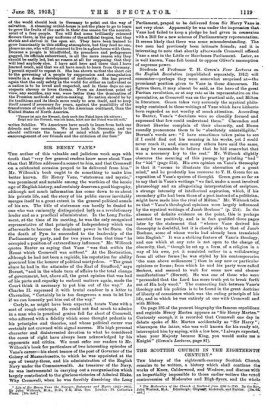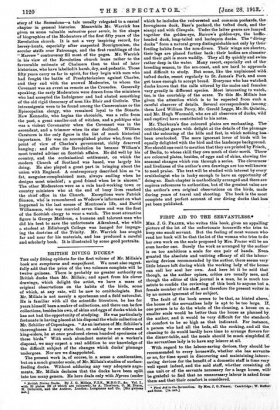THE SCOTTISH CHURCH IN THE EIGHTEENTH CENTURY.*
TaE history of the eighteenth-century Scottish Church remains to be written, a history which shall continue sue the works of Knot, Calderwood, and Wodrow, and discuss-With an impartiality impossible to those earlier writers the 'eked controversies of Moderates and High-flyers, and the *hOle • The Moderators of the Clutch Of Scotland: from Vf) to 1740. By the Bev :John Warrick, M,A, Eilinhhrghl_ ninterann,md Fnrrie!. 11016
story of the SecesSions—a tale usually relegated to a casual chapter in general histories. Meanwhile Mr. Warrick has given us some valuable menioires pour servir, in the shape of biographies of the Moderators of the first fifty years of the Revolution church. It is not a very inspiring record, for heresy-hunts, especially after suspected Bourignonism, the secular strife over Patronage, and the first rumblings of the " Marrow " controversy fill most of the pages. Mr. Warrick in his view of the Revolution church leans rather to the favourable estimate of Chalmers than to that of later historians, who have labelled it harsh, dry, and pedantic. Those fifty years carry us far in spirit, for they begin with men who had fought the battle of Presbyterianism against Charles, and they end with the avowed Moderates, to whom the Covenant was an event as remote as the Crusades. Generally speaking, the early Moderators were drawn from the ministers who had accepted the Indulgence and had abated something of the old rigid theocracy of men like Blair and Guthrie. The intransigents were to be found among the Cameronians or the Episcopalian clergy, who remained loyal to the Stuarts. Hew Kennedie, who begins the chronicle, was a relic from the past, a great smeller-out of witches, and a politique who was a violent Covenanter when the Covenant was in the ascendant, and a trimmer when its star declined. William Carstares is the only figure in the list of much historical importance. He was an accomplished plotter who, from the point of view of Charles's government, richly deserved hanging ; and after the Revolution he became William's most trusted adviser on Scottish affairs. He did well by his country, and the ecclesiastical settlement, on which the modern Church of Scotland was based, was largely his doing, He also played a great part in bringing about the union with England. A contemporary described him as "a fat, sanguine-complexioned man, always smiling when he designs most mischief ; a good friend when be is sincere." The other Moderators were as a rule bard-working town or country ministers who at the end of busy lives reached the chief office in the Church. Exceptions were Patrick Siwson, who is remembered as Wodrow's informant on what happened in the last scenes of Montrose's life, and David Williamson, who was married seven times and was the first of the Scottish clergy to wear a watch. The most attractive figure is George Meldrum, a humane and tolerant man who did his best to save the unfortunate Aikenhead, who while a student at Edinburgh College was hanged for impugn- ing the doctrine of the Trinity. Mr. Warrick has sought far and near for his materials, and has produced a careful and scholarly book. It is illustrated by some good portraits.



























































 Previous page
Previous page